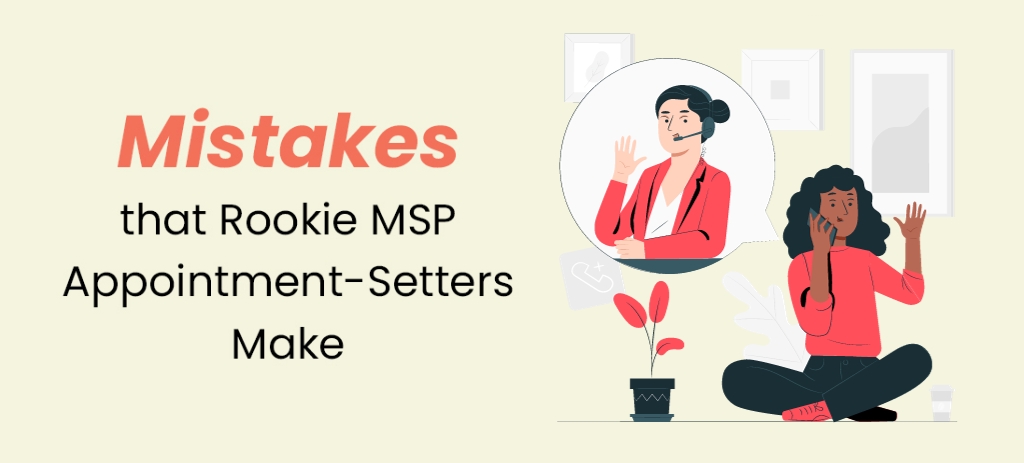
Mistakes that Rookie MSP Appointment-Setters Make
Rookie cold-callers are new and so of course they’ll make mistakes. And that’s okay. We all make mistakes! Even veteran outbounders aren’t perfect, in fact, I’d say most of us would agree that blunders can often be our best teachers.
However, some mistakes are avoidable, and not only that, some can be so impactful that if left unchecked, they can potentially ruin a lot. These are the worst kind of errors. The consequential hard-to-spot kind; ones that by the time we notice them, six months have passed and it’s super obvious why our appointment calendar is all tumbleweed and beat-up trucks.
So that’s what this article is about. The big kahuna mistakes that newbie BDRs for MSPs (and Managers) must anticipate.
Failing to Schedule Dialing Blocks
Let’s face it. Most of us couldn’t cut it as a full-time BDR. It demands high energy, a positive mindset and ruthless determination!
However, as high-energy and determined a good BDR may be, many don’t realize they lack a crucial ingredient for becoming a consistent winner.
Discipline!
The missing ingredient is discipline.
Discipline matters because every BDR, no matter how self-motivated they are, will have bad days. Days they are tired. Times they won’t feel like themselves. Days they won’t want to have this job.
So, how do we deal with these ups and downs?
We simply need to enforce the embedding of discipline into the outbound process.
More specifically, the BDR needs scheduled call blocks on their calendar. And everyone, including the Sales Manager or MSP President, must respect those times as sacred.
This means no scheduled meetings during call blocks!
It means we need reporting to track call activity during those blocks.
We need to warm them up before call blocks and check in afterwards to gauge their spirit.
And finally, if we really want to encourage discipline, we ought to throw in some financial rewards just for consistently showing up to call blocks.
Again, I can’t say this enough, discipline isn’t a nice-to-have for this line of work – it’s an absolute necessity.
Assuming Objections are Real Objections
Most BDRs know the job will be hard before they start. I mean, everyone knows cold-calling is an uphill battle!
However, what surprised me was how quickly some gave up during a call.
For example, if a prospect says, “we have an IT provider already,” some rookies totally lose their composure. There is an uncomfortable delay in their follow up and their tone sounds goes from upbeat to defeated and sad.
So let’s fix this!
First, understand that most objections aren’t really objections – it’s just a natural response to a cold-caller they don’t trust. Instead, use this as an opportunity to learn more about their current priorities and to assess whether a meeting may benefit them.
Instead, practice asking questions that takes words out of their mouth.
“I bet you have a provider who’s pretty good at computer support?”
And second, don’t forget to practice. You have to respond quickly to any “objection” and maintain your original confidence and energy.
“Wonderful, that makes sense that’s actually why I called…”
Practice makes perfect!
Assuming BDRs must be Services Experts
Story time.
When I started focusing on MSP appointment-setting services, I thought the key was to learn as much as possible about managed services solutions.
I read about cloud migrations, watched YouTube videos about QBRs, and learned the basics of NIST.
My hypothesis was that if I had a deeper understanding of the solutions, I’d set more appointments!
So what happened?
Well, I gave “tech talks.” I asked about migrations and QBRs.
Can you guess how it worked out?
“We got IT already.”
“Our IT provider does QBRs.”
“We already migrated.”
Conversations dried up fast. My hypothesis was wrong.
The lesson? Prospects’ already have a decent IT provider most of the time and focusing on generic MSP solutions doesn’t stand out.
Instead, we must understand what business problems the average MSP isn’t solving and that we can address; why a particular prospect segment cares about that difference; and finally, we must prepare probing questions to spark a real conversation.
Therefore, rookies should focus less on solutions and more on the prospect’s problems in order to get going in the right direction.
